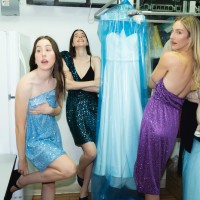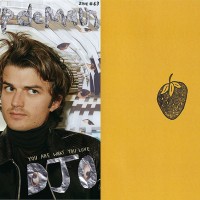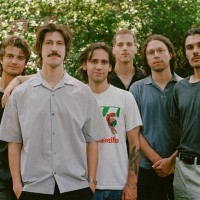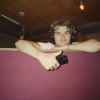Interview: Savages' Jehnny Beth on their new album, 'Adore Life'.
Interview: Savages' Jehnny Beth on their new album, 'Adore Life'.
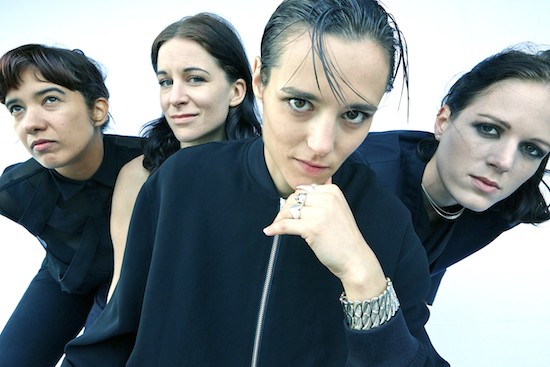
Savages blazed into the post-punk scene in 2011, releasing the distinctive and menacing debut album 'Silence Yourself' less than two years later. As we begin 2016, their sophomore release 'Adore Life' looms closer than ever. Themes of love mesh with anxiety, frustration, and taught guitars. Though complex, the listen remains as rewarding as ever.
Savages frontwoman Jehnny Beth speaks with a frankness and intellect that is at once disarming as it is engaging. Her incisive thoughts reflect the steely presence the singer brings to live shows, but she is nowhere near as intimidating to talk to as her performance would have you believe. Throughout our chat, she demonstrates a heightened awareness of just how ridiculous the world 'Adore Life' will be born into is, and how that's reflected throughout the album's various narrative threads.
"... this raised fist, is a way to say, yes, adore life, but it doesn't come easy, necessarily."
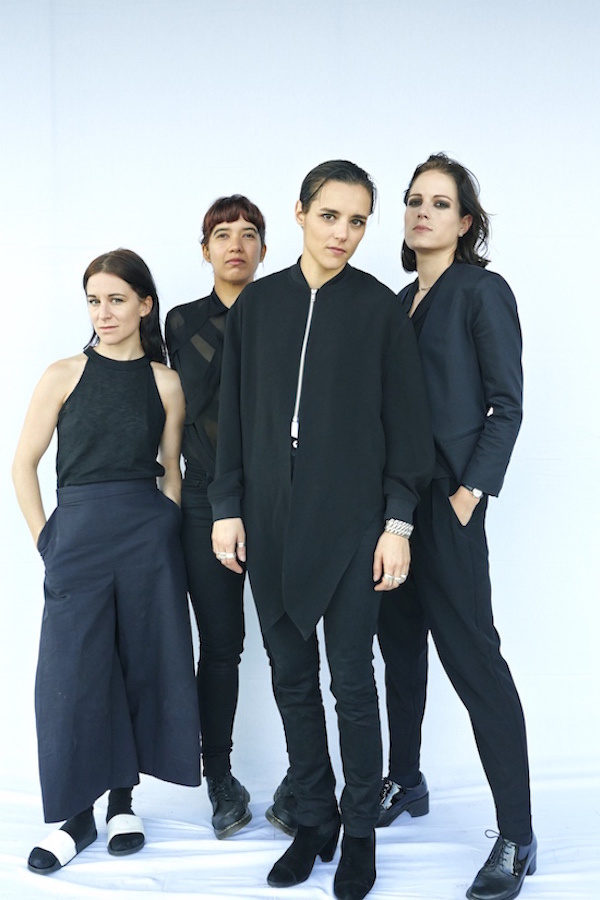
COUP DE MAIN: Savages' new album, 'Adore Life', is out later this month. How would you describe this album in a single sentence?
SAVAGES - JEHNNY BETH: <laughs> That's probably the hardest question of all, but I will try my best! 'Adore Life' is probably something really great to wake up in the morning, especially with the first track, and then it would lead you up to different kinds of moods; probably one for each day of the week, or one for each hour of the day. It's a very nuanced record, more than the first one, I'd say, which explores various feelings - sometimes very opposite feelings, going from one extreme to the other - so it would probably give you a short breath and it's quite exhausting, but definitely worth your money and your time, I'd say.
CDM: When the album was announced, the band said: "It's about the music and the message together, one and the same.” How do you marry your often-positive messages, such as those in 'Love Is The Answer', with the menacing sound of your music?
JEHNNY BETH: When I started writing the lyrics we were still on tour, and half of my lyrics were very positive, and very hopeful, very warm. Until we tried to add music to it, it was quite unsure for us if that was going to work; how we were going to be able to include these feelings into Savages. What was really interesting was that the music could say something the words were not saying. If you are talking about love on top of a very distorted bass, it has a different meaning than if you're talking about love on top of an acoustic guitar. That was interesting to explore; these contradictions, these tensions. I think we like to look for contrast in what we do. It's true though, the message matters to us as much as the music and they go along together. Each musician in the band is interested in the message as well as the music, in the sense that each of us want to concentrate on what we're trying to say, and every instrument is aiming to support that. I think if it's a song about frustration, if it's a song about boredom, the drums would express that cry of despair, you know? I think it matters to us that the four of us are connected in terms of meaning, in terms of purpose and intention.
CDM: The clenched fist, as pictured on the 'Adore Life' cover art, has long been a symbol for revolution and rebellion. Why did you choose it as a visual representation for this album?
JEHNNY BETH: We tried many things for the cover. We were not really satisfied with what we had. It was interesting to have a title like 'Adore Life' when 'Savages'/'Adore Life' in itself is a contradiction, isn't it? It seems like a paradox; like two ends of opposite extremes. What we wanted to find was an artwork that would represent - with the title 'Adore Life' - these contrasts in what you can hear on the record. In a way, if you're saying “adore life” and it's just about romanticism, it wouldn't really represent the record, or the music, or the intent. In a way, to have this raised fist, is a way to say, yes, adore life, but it doesn't come easy, necessarily. What you're going to hear inside will be full of these contradictions.
It's my hand on there. We had the idea first to use my hand because there's a heart tattoo on my wrist, because the record is a lot about love. We were like, 'Oh, why not try to take a picture of your tattoo and see where that goes?' We took loads of pictures and we tried different things and we ended up like that.
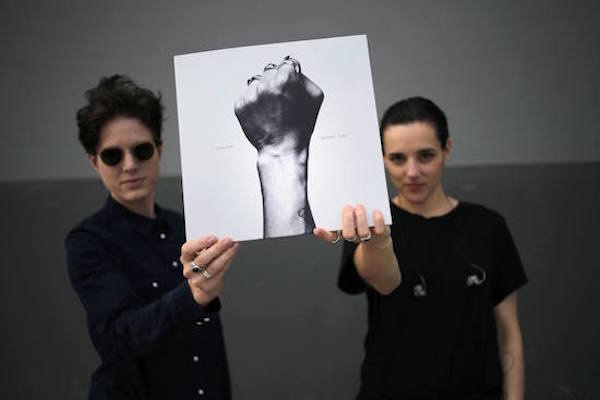
CDM: Although it was announced prior to the high-profile terror attacks in Paris, fans have identified a link between the themes of lead single 'Love Is The Answer' and the resulting defiant solidarity with Parisians. Whilst you couldn't have foreseen the specific event, is the song intended to speak to those affected by similar tragedies?
JEHNNY BETH: It was written maybe two years ago, so it had no connection whatsoever with anything that happened in Paris, or in the world. It comes from a more personal place. Songs throughout history take different meanings and that's what songs are for; receptacles for every individual's personal feelings, but also for feelings of a group or community. Songs have this ability to be shared and used and appropriated. Once you've written a song it doesn't really belong to you anymore, it's something that travels around people and groups of people. That's what a song is, and what it should be.
CDM: 'Sad Person', a song the band are already playing live, is directed at a very typical individual. Lyrics such as “question everything you do, you are never satisfied,” and “the more you have, the more you crave,” are representative of many millennials paralysed by self-doubt and circumstance. Is the song aiming to motivate people stuck in this familiar rut?
JEHNNY BETH: It was a song to motivate me, first! I think we have a tendency in my generation, and probably younger generations more: we want to have the choice. We love the idea of having multiple choices. I think it's a bit of a disease for the mind; it's a bit of a poison. It's a bit dangerous because if you have too many choices, and you want to keep all these options open, then you never really commit to anything. Then you will find life extremely hard, because every step you're doing you need to commit to something at some point. I think in commitment, and maintenance, and endurance, and perseverance, and long-term relationships - not necessarily love relationships but work relationships, everything long-term - we tend to be scared. We feel trapped really easily and we have anxieties. I think it's a disease because we never do anything if we don't commit to something. It makes us sad people; people who are never satisfied. We choose something and then we're like, 'Oh, I have this, but now I don't have this' - so we concentrate on the things we don't have anymore. Once you're going to do a choice, like if you decide to be an artist, for example, you take that leap; you jump. The bigger the jump, and the more you cut out any kind of options for you to come back, the better artist you will be. You have to take this without fear, you have to take it wholly, and in our generation and our time I think people are having more and more difficulties to make that choice.
CDM: You recently posted on your Tumblr that the key to a successful live show was three words – “DO NOT THINK.” Does that apply to any other aspects of life?
JEHNNY BETH: These words I used early on to control my stage fright. The irony of this was that I would concentrate really hard before a show to remember that phrase that I knew was going to help me, and I was like, “Oh my God, I can't remember it!” I'd keep thinking about it and thinking about it, and once I remembered it, the words were, “Do not think.” That always made me laugh. I think it applies with stage for sure; you have to switch off part of your brain. There's another part of your brain that works though - your intelligence is working but not in the same ways. I think the whole aspect of our jobs - to be musicians, to be artists, to be writers - is constantly balancing between intuition and understanding. Analyse your time, analyse where you are, think about your place, your space, your presence, your time, think about what you're doing… but also do it. And when you do it, you can't! So yes, it's a constant healthy balance of both you need to be able to play with, to feel balanced.
CDM: 'I Need Something New' opens with the line, “I need something new in my ears.” This could be about far more than simply waiting for a band's new album! What is it that you're hoping to hear?
JEHNNY BETH: This song was written on the road. I wrote the lyrics on a plane journey, I remember. I think touring can sometimes become a bit repetitive. Without telling the girls, I wrote these lyrics during the day, and in the evening I said I was just going to say these lyrics onstage and see what happens, and surprised the rest of the band. Sometimes I would do that, not at every show, and that's how we wrote the song; how the core of the song was written. It was sort of a meta-song, in the sense that you order something that you need to break - a pattern, you need to surprise yourself, take a risk. Sometimes I feel like when I prepare things like that for the shows and I don't tell anyone, I take a risk and I do something unexpected, I feel like I have less stage fright, paradoxically. If I know that I'm going to throw something out there that's going to be totally out of control, then in a way it's less scary than going onstage and trying to repeat the same thing.
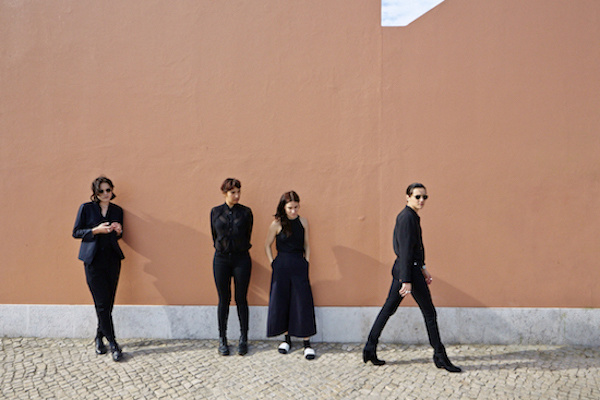
CDM: You recently worked with Julian Casablancas on a cover of a song by Danish band Sort Sol. How did you find working with Julian?
JEHNNY BETH: Fine! Great! <laughs> We met in South America, in Summer 2014. We had met before, because he came to see us play several time in New York City, from very early. The first time we ever played in New York, he was there! I knew he was a fan, and it was equal for me - I grew up listening to The Strokes, and I admire the integrity of his music. He's very determined; it's very clear what he wants, which I think is great and brave. We talked about working together - at the time we didn't have a specific project in mind. We joked that we were both singers in rock bands and had our own record labels, so there was a parallel there that amused us. We talked through e-mails and had different ideas, but we knew we wanted to release something on both our record labels at the same time. Johnny Hostile - Savages' producer - had this idea of the Sort Sol cover. He thought immediately, 'Julian and Jehnny are going to love this!' It was a whole exercise, we wanted to be very faithful to the original and do a certain homage, so we worked with Warren Fu on the video. His team of people is amazing as well - I went to his office in L.A. and everyone is really amazing, and it was really very easygoing, considering that there were two labels involved. Everyone was really excited and it was just very simple to do.
CDM: Finally, looking to the future - Coup De Main is based in New Zealand. It's been almost two years since a stunning performance at Laneway Festival 2014 and we are keen to know if Savages have any plans to bring 'Adore Life' to us on a forthcoming tour?
JEHNNY BETH: Yeah, we will! I'm sure we will. I wouldn't be surprised if we were doing Laneway again because we loved it, and we'd love to do it again. I'm sure that will bring us to you. I'd love to have more time to visit New Zealand - I have some friends from there and I've heard it's just wonderful. It's beautiful. To be honest, this is going to sound a bit cliché, but I owe a lot to New Zealand for their Mānuka honey and propolis for my voice! <laughs> I buy products straight from New Zealand and that's saved me from many, many, tirednesses of the voice! It keeps making me sing, so that's great!
Savages' new album 'Adore Life' is out now. Click HERE to purchase via iTunes.
Watch the music video for 'Adore' below...











